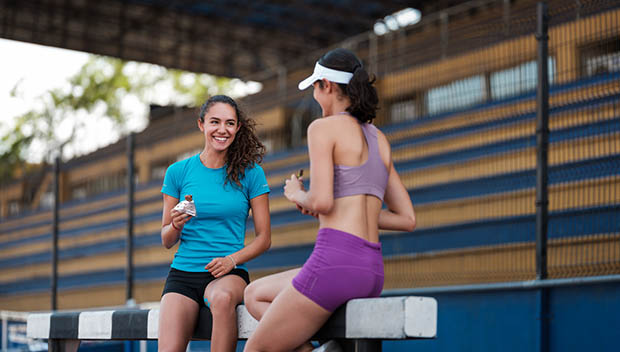
Triathletes are busy people. It isn't easy training for one sport, and these athletes have three disciplines to tackle. Actually, make that four as most consider nutrition to be the fourth component of the swim-bike-run. While attention might be paid to what is consumed to fuel the individual training performances, too often normal meals and snacks gets overlooked.
Nailing nutrition day to day is crucial to staying healthy and performing well in the long term. Triathletes have the unique complication of multiple training sessions a day, sometimes back to back and other times separated by hours, which makes frequent small meals more appropriate for meeting nutrition timing needs. For these athletes, meal prep and planning can be especially helpful in maintaining healthful eating that meets energy demands.
Sample Day 1: Morning Swim + Lunch 4-Mile Run
- Pre-swim snack: banana and coffee
- During swim: drink mix, roughly 30 grams carbohydrate
- Post-swim breakfast: oatmeal with berries and yogurt and two eggs
- Pre-run snack: sports drink
- Post-run lunch: turkey sandwich on whole grain bread, apple with nut butter
- Dinner: tofu and vegetable stir fry with oranges and brown rice
- Night snack: small protein shake
Sample Day 2: Morning Swim + Evening 90-Minute Interval Ride
- Pre-swim snack: half bagel with nut butter and coffee
- During swim: drink mix, roughly 30grams carbohydrate
- Post-swim breakfast: smoothie with protein powder
- Lunch: bean burrito bowl with salsa and guacamole
- Pre-ride snack: granola bar
- During ride: hydration and two gels
- Post-ride dinner: grilled chicken salad with baked potato
- Night snack: small protein shake
Sample Day 3: 2-hour Ride + 30-Minute Run Brick Workout
- Breakfast: oatmeal with maple syrup, nut butter, banana plus coffee
- During brick: hydration with fuel of roughly 120 grams of carbohydrate throughout effort
- Post-brick: fruit smoothie with protein powder
- Lunch: chickpea, vegetable, quinoa and feta salad with oil/vinaigrette dressing
- Post-ride dinner: flank steak fajitas with corn and avocado
- Night snack: popcorn with nutritional yeast
Remember that how much you eat depends on the duration of your training, your body weight, your body composition goals, your performance goals and many other considerations. To get a more dialed in and individualized plan, work with a sports dietitian.
READ THIS NEXT: A 3-Day Meal Plan for Runners
About the Author









Discuss This Article